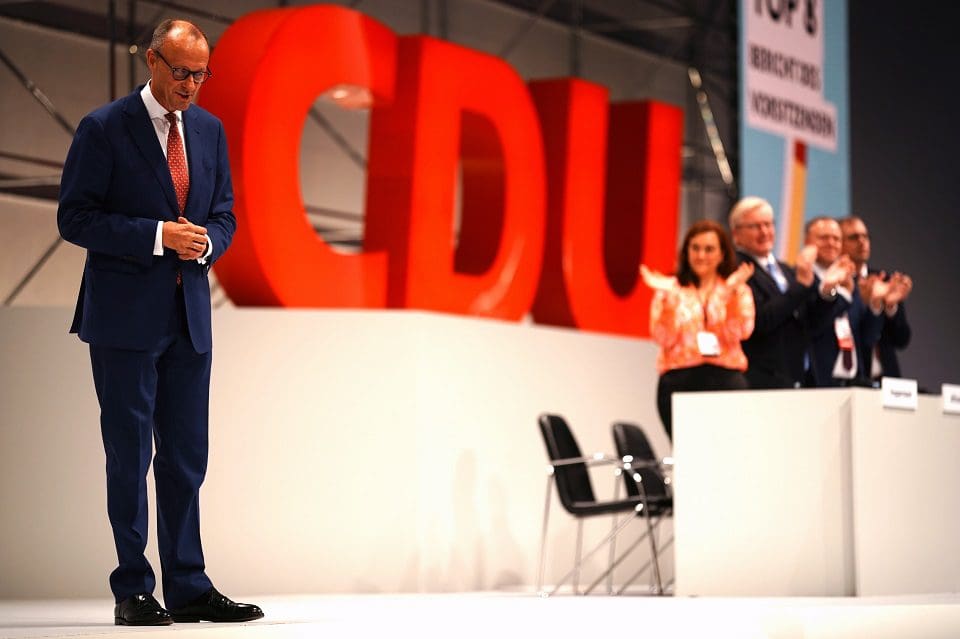After the unsuccessful attempt to expel Hans-Georg Maaßen, the leader of the conservative faction of the party, and with the support for AfD surging, the CDU may be forced to create a radical shift, and assume the role of a more aggressive opposition party. The first step of this process has already been taken: the centrist CDU Secretary General Mario Czaja has been let go, and conservative economist Carsten Linnemann has been appointed to fill this key role on an interim basis. This may be the very last opportunity for the CDU to become the leading force on the German right again. An analysis by Bence Bauer, head of the German–Hungarian Institute for European Cooperation at MCC.
The Strengthening of the AfD and the Lopsided Role of the CDU
The right wing-populist Alternative für Deutschland (AfD) party has been achieving considerable success lately. It has won a district council election and a mayoral election in the former East German regions of the country. With its current support of 19–20 per cent, the AfD is the second most prominent political force in Germany, despite the other parties attempting to put them in a ‘political quarantine’. The AfD is currently not governing in any of the federal states, is not part of the coalition-forming game of ‘everybody with everybody’, it is denied parliamentary vice chair positions, the party foundation has to sue to receive its due funding, and it is locked out of all political discourse. Consequently, the AfD has become a more ferocious and authentic critic of the left-wing ‘traffic light coalition’, and the other parties as well, including the CDU. Their critique is clear:
the CDU has shifted left, is trying to appease the presumed or real societal expectations of the left-wing and green political forces, and thus has abandoned its own identity, roots, and voters.
On a state level, the Christian Democratic Union (CDU) is in a governing coalition with virtually all other parties except AfD, and thus is a quasi governing party in the Federal Council. Additionally, the party agrees with many measures taken by the governing coalition on a federal level, and is very subdued in its objections to the actions of the left-wing parties in power. Considering all these facts, many analysts believe that the CDU is unable to present itself as a forceful enough opposition party, while others believe they do not fill the opposition role at all.
This has led to a deep chasm within CDU, since the party’s base and its local chapters in the Eastern part of the country would like to take a stronger stance against the leftist agenda of the federal government, and pay more attention to the issues raised by AfD. CDU certainly has the opportunity to do all that, since a so-called ‘representation vacuum’ was formed on the right in recent years, meaning that many conservative voters failed to find their ideal party.
The Failed Exclusion Policy of Party Leadership
The role of Hans-Georg Maaßen is quite revealing if we want to understand the current situation of the CDU. The conservative politician has been serving as the president of WerteUnion, the iconic organisation of right-wing CDU members, since the beginning of the year, and was one of the designated speakers at CPAC Hungary 2023 back in May—and the only CDU politician to speak at the event.
Previously, Maaßen had been removed from his position at the Federal Office for the Protection of the Constitution for his disagreements with then-Chancellor Angela Merkel. He has been an avid critic of Merkelian politics, immigration policies, and the leftward shift of the CDU ever since, which continued under Merz. The former CDU Secretary General, who stepped down just a few days ago, was one one of the biggest opponents of Maaßen, and it was also under his leadership when the party tried to expel the prominent conservative figure.
CDU Deutschlands on Twitter: “Das ist #CDUpur! Unser neuer #Generalsekretär Carsten #Linnemann spricht in den Tagesthemen über seine Vision für die Zukunft der CDU. 🚀 pic.twitter.com/b3BkbvqBDQ / Twitter”
Das ist #CDUpur! Unser neuer #Generalsekretär Carsten #Linnemann spricht in den Tagesthemen über seine Vision für die Zukunft der CDU. 🚀 pic.twitter.com/b3BkbvqBDQ
Societal Fault Lines
In the meantime, there has been a huge loss of direction in German society as a whole.
The 2015 migration crisis still has not been solved,
which has led to numerous social, educational, housing, labour, and—most importantly—economic and crime problems. The influx of immigrants into Germany has still not stopped either. The country was also late to crawl out of the Covid crisis; lockdowns ended up lasting for too long, while the opening was slow and cautious, and economic recovery weak. During the time of the energy crisis, the cheap and secure nuclear energy production was halted on an ideological basis, while CO2 emissions are on the rise due to the coal power plants working at high capacity again.
In the case of all three crises, Germany has gone in the wrong direction in the eyes of the international public as well, and has come out of these crises weaker than it had entered them, which has mostly hurt its own populace, the lower middle class especially. Because of all these factors, societal fault lines have deepened. Many voters have become dissatisfied with the ruling parties’ political decisions, particularly in the Eastern part of the country, which has led to even more frustration.
Wiggle Room for Conservatives
The conservative camp in Germany is divided: on the one hand, the CDU is still struggling with the Merkel legacy, the party’s shift to the left, its opposition to the current administration, and itself. It is yet to find the role of a self-confident opposition party it is expected to take on, which could lead it to success. Polling data shows that the party’s support is stagnant at 26–28 per cent. It is unable to transform the diminishing support of the incumbent administration into political capital for itself, unlike the AfD, which is very much doing so.
In the meantime, the left-wing coalition keeps taking unpopular actions, such as the self-identification law, the liberalisation of the citizenship process, the legalisation of abortion, gender issues, and its economic policies (such as the heating law, the energy and fiscal policies) are not supported by a majority in Germany either. Despite that, the administration still wants to push through its agenda on an ideological basis at an accelerated pace. A strong opposition could have honed in on that already, but so far, only the AfD has managed to do that effectively.
Change Coming in the CDU?
The successor to the outgoing Mario Czaja will be the 45-year-old Carsten Linnemann, formerly one of the vice presidents of the CDU. The new general secretary is a conservative economist. On the politicla spectrum he is closest to party president Merz: during the party presidential elections, he was one of Merz’s most loyal supporters.
The fact that Merz appointed someone from the conservative faction to serve as secretary general, a position the holder of which is also responsible for the party’s campaigns, could be a sign that Merz is shifting to the right,
will further distance himself from the party’s earlier shift to the left, and will pursue a more pronouncedly conservative policy.
The vacant vice presidential post could also be filled by a more conservative figure, moving the party leadership in that this direction. There is a high demand for this among party members, supporters, and voters. Until now, party leadership tended to ignore the more conservative opinions of its base. This could change now. CDU has the most wiggle room in immigration and economic policies. With more forceful, louder, edgier stances, it could win back the preference of conservative voters. The results of the 2023 Berlin state election from February of this year is proof that this can be done. Back then, CDU made headway by focusing on traditional conservative issues such as migration, security policy, economy, governance, and transportation policy. The voters are looking forward to CDU’s answers, and this may be Merz’s very last chance to take the initiative. If he fails to do so, not only will the veteran politician, turning 68 this year, have to give up his Chancellor ambitions, but he will also have to give up his presidential chair.

Hungarian Implications
From a Hungarian viewpoint, the CDU’s shift to the left barely seems comprehensible, let alone its cooperation with left-wing parties. We must add, though, that of course the Hungarian circumstances and conditions are completely different. The Hungarian conservative community is in a wholly different position: there is no ‘representation vacuum’ in Hungary, the Fidesz-KDNP coalition covers the whole conservative voter base: the camp of the centre-right is unified. The is no pressure to form coalitions or make compromises, and the government is able to carry out its conservative programme unhindered. This unity has been achieved over the course of over 20 years, by the way, and was preceded by systematic organising work, community building and value creation efforts. This type of organisational effort may be what the German conservative camp would need, too.
The circumstances in Germany are different because of the domestic political system but also because of the unique situation of conservatives there. Consequently, even though they formally cooperated with each other within the framework of the European People’s Party for a long time, Fidesz and the CDU are in two completely different positions by now, with only informal cooperation and dialogue remaining. At the same time, Fidesz has no formal relationship with the AfD, despite the fact that both the leaders and voters of the German party hold great sympathy for our country.
It must also be noted that the CDU/CSU voter base is of a more conservative disposition than the party leadership, and thus they are likely closer to the Hungarian immigration, family, economic, social, and other types of policies.
Today, the Prime Minister of Hungary is a daily topic of conversation in German public discourse:
many people admire him, while many completely reject him, regardless of their political affiliation. However, the German discourse about Hungarian politics cannot be separated from the public sentiments in Germany, thus the debates about Hungary reveal more about the state of affairs in Germany about Hungary itself.
The dividedness of the conservative camps in Germany, as well as the gradual gaining ground of the AfD are primarily the consequence of Angela Merkel’s controversial policies related to the Greek rescue package and her failed immigration policies. In short, it was the CDU itself that has created a dangerous competitor on the right. It is only the icing on the cake that Merkel has always felt an alien within the CDU, and the CDU felt the same way towards her, because she had come from outside the party and never had to climb the ladder. She was actually always more popular with the Greens than with the CDU members.
The course CDU Federal Chairman Friedrich Merz and Secretary General Carsten Linnemann will be taking will be interesting to look out for, just as for what the role the incoming new CDU acting president will play and how strong his position will be. Furthermore, how state prime minister and CSU President Markus Söder will perform in the upcoming Bavarian election will also carry great implications. We Hungarians should watch out for what officials in the administration responsible for relations with Germany will have to say and it may also be relevant to have a look at the conservative institutional network and its connections.







